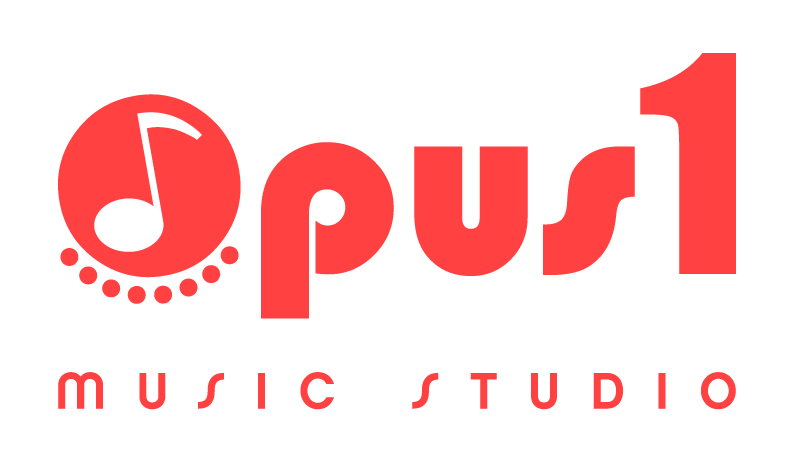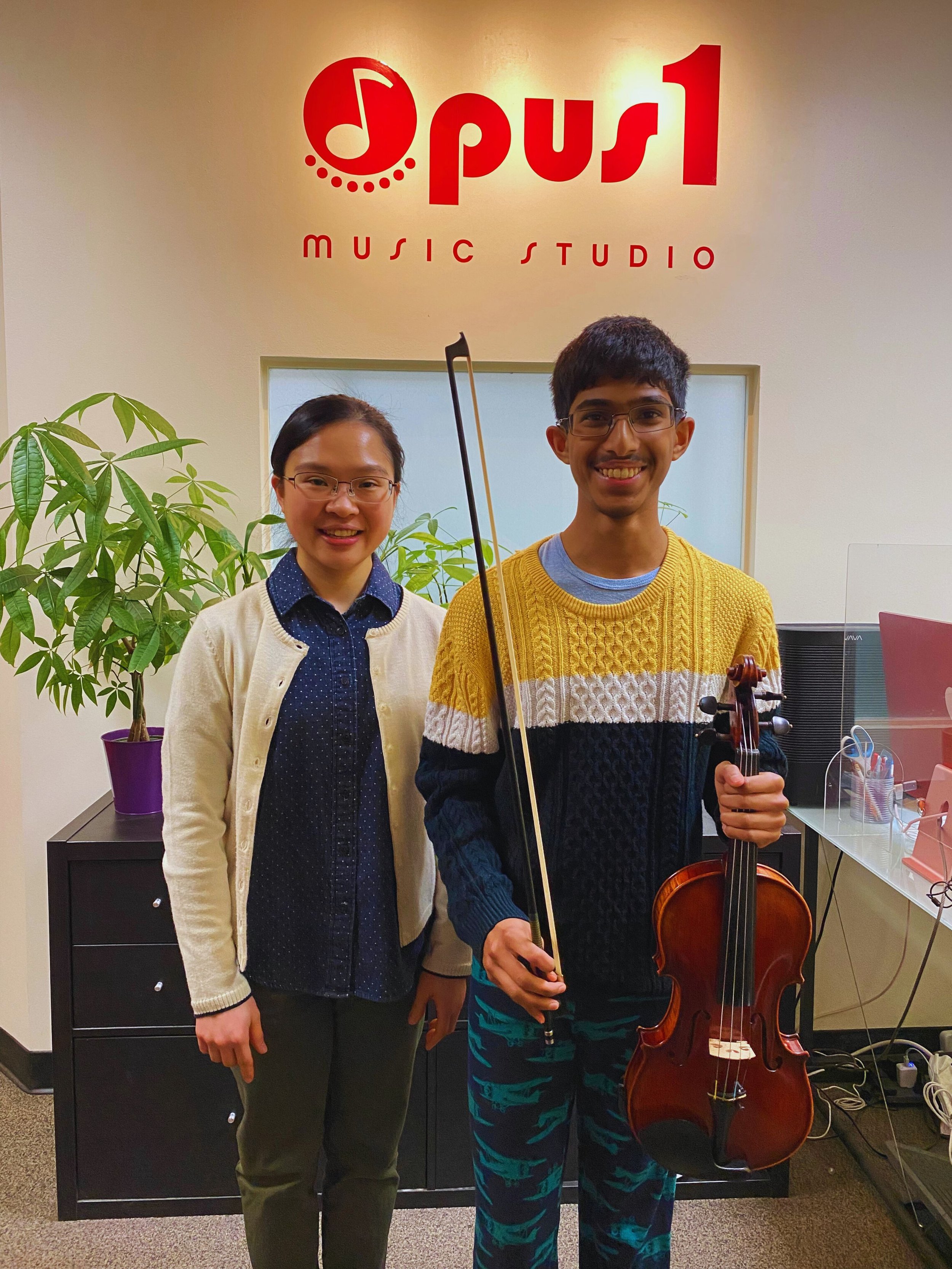Meet Aritra, a dedicated violinist with a passion for music that spans over seven years. Having started his musical journey in elementary school, Aritra recently joined Opus 1 and shares his experiences, from refining his technique under the guidance of his teacher, Pei-Shan, to his recent selection for the San Jose State University Honors Orchestra. In this interview, Aritra offers insights into his musical journey, balancing academics and music, and valuable lessons learned through his dedication to the violin. Check out the full interview below!
How long have you been studying the violin, and why did you choose the violin as the instrument you wanted to learn?
I've been studying the violin for around seven years, but started at Opus 1 about a year ago. I started in my elementary school orchestra in fourth grade, and I selected the violin mainly because it was easy to carry around, but then I grew to love playing the violin! I am a member of my high school orchestra at Gunn High as well.
What has your experience been like at Opus 1 so far?
I really liked it when we switched to my current teacher, Pei-Shan. She has been really helpful with helping me improve and refine my technique.
You recently got selected for the San Jose State University Honors Orchestra. Congratulations! Can you tell me a little bit about the Orchestra, and what inspired you to try out for it?
I was interested in the Honors Orchestra because I wanted to learn from some college music professors and interact with other students because I've just been in school orchestras for a long time. So this is kind of my first honor orchestra opportunity in a couple of years. It is mostly composed of high school students, and you get the opportunity to work with college music professors. My teacher at Gunn High School nominated me. You have to submit your skills, and some excerpts, and if you are selected, you get to join the orchestra and are given two performance opportunities, which are coming up in about two weeks.
Have you competed in other competitions or been a part of other orchestras before besides your high school orchestra?
I've been in a few local honor orchestras in the past in elementary school, and also auditioned for All-State a few times. All-State is basically an opportunity where you get to audition for an honors orchestra where everybody from the state of California who's playing an instrument can audition.
Can you tell me a little bit about how you've been able to balance your life and commitments at school along with taking lessons at Opus 1 and now preparing for the Honors Orchestra?
Basically, I just try to set aside time and make it a habit. So I like to make violin practice a habit that I can just do every day at the same time. That way I do not worry about it because I know to practice at the same time every day, and I just do it.
Do you have a performance either that you did with Opus 1, or with your school that you are maybe really proud of that you can tell me about maybe what piece you played and what made it feel like such a great accomplishment for you?
Our school orchestra in the fall performed a set of rather difficult pieces. One of them was a Latin American music-inspired piece, and it was like Baca, it's a style of music from Puerto Rico. The piece was difficult mainly because we had to shift up rather really high in the first violin. We had to shift up to seventh position, which is rather rare in our music at our level. So the fact that I was able to play that and still make it sound really expressive while still playing it in tune, that's something I'm really proud of. It took a long time for me to get to the point where I could do it.
How has studying with teacher Pei-Shan helped you achieve some of your goals as a musician?
I'd say that she has really helped me work on my technique so that I can play more polished. For example, my spiccato really improved after I started working with her. She pointed out a lot of things that I wasn't doing correctly with my bow hold. So fixing those things really helped me to get a much smoother staccato, with a much less harsh sound.
What lessons have you learned through your musical studies that you can apply to other aspects of your life? Maybe things that aren't necessarily related to music?
I've learned that it is always good to have consistency in what you're doing. So it's better if I practice one hour each day instead of practicing for larger periods of time and skipping days after that. Similarly with studying for school, it's better if I break that studying up into 30-minute chunks and do that for five days rather than cramming all that studying into three hours the day before the test.
What advice would you maybe give to other people trying to learn to play an instrument?
I'd say just take it step by step and you should also know where you're going with what you're playing. In the beginning, you might not sound as good as you want, but gradually you'll get better and better over time and eventually you'll, you will sound much closer to all the virtuosos you admire.
How do you prepare for performances when you know you have one coming up?
So when I'm preparing for a performance, I'm going to focus more on the smaller aspects generally, and focus more on the expression because by the time the performance comes, my technique is probably as good as it's going to be. But, I know I can improve smaller aspects of my playing, like dynamics and phrasing, because I know I can control those things.
How is performing with an Orchestra different from performing solo? What have you learned from the experience?
In some ways, it's easier to perform with others, and in other ways, it’s much harder. It's easier because when you're playing in a group, you've got the support of others and you can listen to others. So if I'm playing in the orchestra, I can have a much clearer idea of what the intonation should be so I can just lock onto the note and play the exact right note. But when I'm playing by myself, I have to guess it in my head. It’s harder because sometimes you have to make adjustments on the fly. Also, when I'm playing solo, I have a bit of freedom with the rhythm and I can just play the rhythm in a way that makes sense to me. But when I'm in a group, I have to watch the conductor continuously while also reading my music and paying attention to what everybody else is doing. So it's multiple things that I have to take in at once. Being in an orchestra has been a great exercise for my brain. I'm pretty used to performing now. In our rehearsals, we practice these skills over and over again, so I’ve kind of just become used to it. So now automatically, whenever we start playing, I'm going to start tuning in to what's happening in my section and outside my section and what's happening with the conductor.
How do you think performing with an orchestra, and studying music theory, can make you a better musician?
I think that studying music theory and composition in relation to playing with an orchestra has given me a lot of insight into what's happening behind the scenes. So for example, if I see an arpeggio, I'll then recognize it as a version of a chord. And similarly, when I'm playing the orchestra, if I understand what the composer's intentions are when they make a piece, it's a lot easier to comprehend how to play it in the way that the composer would want to.

